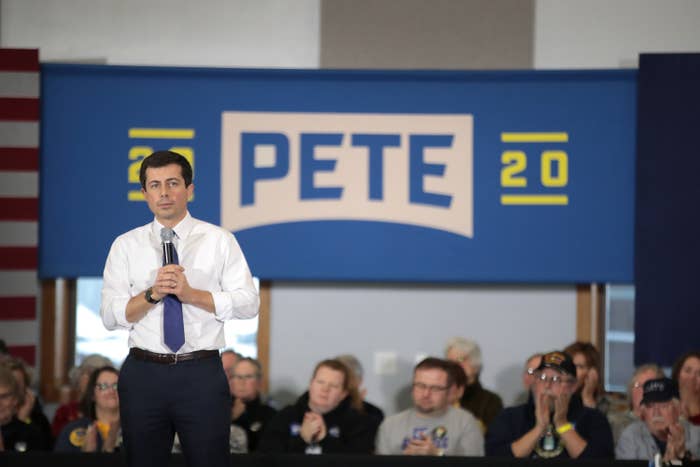
DES MOINES — Bruce Sanders Lehnertz went to Pete Buttigieg’s town hall forum Sunday night aware that the former mayor of South Bend, Indiana — his first choice in next month’s first Democratic presidential caucuses — has struggled to win support from black voters.
It didn’t make sense to him. But Sanders Lehnertz, who is white and from a state that is more than 90% white, acknowledged he himself didn’t “have that much exposure to nonwhite people.”
“I kind of want to sit down with a group of blacks and Hispanics and Asians and say, ‘OK, what are you about?’” he told BuzzFeed News as he waited for the event to begin. “Just kind of get a better perspective of those other races.”
Minutes later, Sanders Lehnertz heard a small group of people of color loud and clear. He heard several Black Lives Matter protesters who had traveled from South Bend to interrupt Buttigieg’s speech, laying out a list of concerns about how his policies as mayor had failed communities of color there. He heard Buttigieg tell the protesters he would “like to talk about it respectfully.”
And he heard the mostly white Buttigieg crowd chant the campaign’s phonetic rallying cry — “BOOT EDGE EDGE! BOOT EDGE EDGE!” — in an attempt to drown out the protesters.
BLM activists opposed to Buttigieg’s candidacy have stepped up their efforts to be heard in the final weeks before the first votes of the 2020 primary are counted in two mostly white states, Iowa and New Hampshire.
In South Bend, activists’ frustrations over Buttigieg’s work on policing, housing, and social justice mostly represent the view of a vocal minority. But they hang heavily over his presidential campaign: A national poll last week put him at just 2% support among black voters, a key demographic for Democrats.
South Bend–based BLM activists, who have been holding semiregular press conferences and calls with reporters, started by trailing Buttigieg last week to fundraisers in Los Angeles. Another group was waiting for him in Iowa when he arrived Sunday for the town hall. They followed him to two events the next day, though they remained outside during town hall forums in Winterset and at Iowa State University in Ames after they were told they could not circulate their flyers, which carried the headline: “Mayor Pete Has a Black Problem.”
The activists also said they plan to be on Drake University’s campus during Tuesday’s Democratic debate.
Sunday night’s disruption started with what appeared to be a diversion. About halfway through Buttigieg’s stump speech, someone near the stage at the State Historical Museum of Iowa signaled a need for medical assistance.
“Can we get medical support?” Buttigieg called out.
Within seconds, Buttigieg, a confused look on his face, was engaged in a debate with someone at the front of the room. (A BLM activist declined to comment when asked if his group was responsible for the call for help.)
Most of the conversation was audible only on one end — Buttigieg, holding the microphone, offered several perfunctory “Mm-hmm”s. Responding to concerns about care for veterans who are homeless, Buttigieg mentioned initiatives undertaken in South Bend to correct the problem. (Homelessness in South Bend dropped by nearly a third during Buttigieg's administration, his campaign says.)
“And if you don’t mind my asking,” Buttigieg asked his interlocutor, “were you there to help us in that effort?”
The conversation went on a bit longer as uniformed police officers approached the stage. Buttigieg kept a calm demeanor but was noticeably frustrated with the exchange. “I think your facts are a little wrong, so I’d love the chance to talk with you about it, but I’d like for us to talk about it respectfully,” he said.
“Can we agree,” he pleaded, “that we can talk about this respectfully?”
A woman near the front shouted out in response: “We’ve been trying to talk to you since South Bend, Pete!”
That’s when Buttigieg’s supporters in the crowd — about 750 of them — began their chants.
“I’m sorry,” he said, “but this is not the best way to have this conversation.”
The protesters — there were at least four — began to chant back as police led them out of the museum.
As the nearly four-minute disruption winded down, Buttigieg returned his attention to the audience, seeming satisfied: “Can we hear it one more time for the idea of respectful, honest, open, and transparent dialogue?”
His supporters were mostly unfazed.
Rick Smith, an Urbandale Democrat who supported Bernie Sanders in 2016 and has signed on as a caucus precinct captain for Buttigieg this time, said he thought Buttigieg handled the incident well.
“When you’re dealing with Donald Trump, they’re going to try to throw you off all the time. I think he’s going to handle that better than all of the candidates,” Smith said.
“I said this to someone before the event started tonight,” Smith added. “I kind of hoped something like that would happen tonight, not because I wanted a disruption, but because I wanted people to see that he was trying to interact and respond to people who differ with him. People with concerns have a lot of campaigns to deal with. The fact that they’re choosing to come here means a little something, I think.”
This tendency to look on the bright side recalled sentiments from supporters last year: During Buttigieg's first swing through Iowa after announcing his candidacy, a heckler dressed as the devil hurled anti-gay slurs at the man who would be the country’s first gay president.
“Look, the next president is going to have to confront things a lot more challenging than being interrupted or having to talk over a little noise at an event,” Buttigieg told reporters after one of those events. “It may be irritating, but it’s also part of the landscape.”
Criticism of Buttigieg’s work in communities of color is at odds with his reputation among black leaders in South Bend. A black former city councillor made waves late last year by endorsing Joe Biden — but other black officials and activists in the city have endorsed Buttigieg or at least defended him against the attack that he doesn’t listen to black voices. And some critics have praised him for how he has listened and responded to their concerns.
The activists have been persistent, though. Some of those from South Bend — including those who disrupted a community meeting with Buttigieg allies last month — are openly supporting Sanders for president. Campaign officials are suspicious about who’s funding their travel. Jorden Giger, a BLM activist from South Bend who also is involved with the pro-Sanders group Our Revolution, told BuzzFeed News via email Monday that BLM members “raised money ourselves” and collaborated with a BLM chapter in Los Angeles to pay for their efforts.
“We have not provided any financial assistance or funding to BLM or BLM South Bend, including travel,” Our Revolution’s Paco Fabian told BuzzFeed News. “Our members are volunteers, and many of our volunteers are involved in a variety of issue campaigns and organizations — environmental, labor, anti-gun violence, etc.”
BLM activists in Iowa this week said they were treated respectfully by Buttigieg supporters and the police officers who responded at the Des Moines town hall.
Chris Broadnax, the activist who first confronted Buttigieg in Des Moines, said he was disappointed in the former mayor's response, which he found demeaning. But he had meaningful conversations with voters after the event, he said: “I really believe we changed a few minds and maybe even switched some people who might have voted for Pete.”
Asked for his thoughts on how the Buttigieg supporters in Des Moines responded to their disturbance, Emmanuel Cannaday, another activist, smiled brightly.
“We’re in Iowa,” he said. “Everybody’s nice.”


